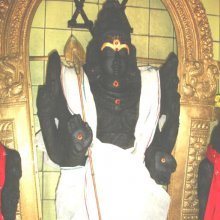Vel, Vēḷ, Veḷ, Vēl: 11 definitions
Introduction:
Vel means something in Hinduism, Sanskrit, the history of ancient India, biology, Tamil. If you want to know the exact meaning, history, etymology or English translation of this term then check out the descriptions on this page. Add your comment or reference to a book if you want to contribute to this summary article.
The Sanskrit terms Vēḷ and Veḷ can be transliterated into English as Vel or Veli, using the IAST transliteration scheme (?).
Images (photo gallery)
In Hinduism
Shilpashastra (iconography)
Source: Shodhganga: The significance of the mūla-beras (śilpa)Vel (“spear”) refers to one of the several “attributes” (āyudha) or “accessories” of a detiy commonly seen depicted in Hindu iconography, defined according to texts dealing with śilpa (arts and crafs), known as śilpaśāstras.—The śilpa texts have classified the various accessories under the broad heading of āyudha or karuvi (implement), including even flowers, animals, and musical instruments. Some of the implements of war mentioned are, for example, Vel.

Shilpashastra (शिल्पशास्त्र, śilpaśāstra) represents the ancient Indian science (shastra) of creative arts (shilpa) such as sculpture, iconography and painting. Closely related to Vastushastra (architecture), they often share the same literature.
India history and geography
Source: academia.edu: Minor Chiefs and "Hero" in Ancient TamilakamVēḷ or Vēḷir is a name related to the historical geography and rulers of ancient Tamil Nadu, occuring in Sangam literature such as the Akanāṉūṟu and the Puṟanāṉūṟu.—Notes: Ātimanti, fourteen īreḻu-vēḷir (Vēḷir-14), 206 notes Manti, 246 notes patiṉoru “eleven”, 258 notes Naṉṉaṉ, Utiyaṉ, tol “primeval (family?)”, 331 notes Paḻaiyar “the ancient”, kuṉṟakac-ciṟukuṭi “little hose of the hills”, Titiyaṉ), see Titiyaṉ (Rajan 2001: 360).
Source: Institut Français de Pondichéry: The Shaivite legends of KanchipuramVēḷ (வேள்) (in Tamil) refers to Kumāra (Skanda), and represents one of the proper nouns mentioned in the Kanchipuranam, which narrates the Shaivite Legends of Kanchipuram—an ancient and sacred district in Tamil Nadu (India). The Kanchipuranam (mentioning Vēḷ) reminds us that Kanchipuram represents an important seat of Hinduism where Vaishnavism and Shaivism have co-existed since ancient times.

The history of India traces the identification of countries, villages, towns and other regions of India, as well as mythology, zoology, royal dynasties, rulers, tribes, local festivities and traditions and regional languages. Ancient India enjoyed religious freedom and encourages the path of Dharma, a concept common to Buddhism, Hinduism, and Jainism.
Biology (plants and animals)
Source: Google Books: CRC World Dictionary (Regional names)1) Vel in India is the name of a plant defined with Aegle marmelos in various botanical sources. This page contains potential references in Ayurveda, modern medicine, and other folk traditions or local practices It has the synonym Feronia pellucida Roth (among others).
2) Vel is also identified with Cardiospermum halicacabum It has the synonym Cardiospermum pumilum Blume (etc.).
3) Vel is also identified with Indigofera linnaei It has the synonym Hedysarum prostratum Burm. f. (etc.).
Example references for further research on medicinal uses or toxicity (see latin names for full list):
· Bibliotheca Botanica (1926)
· Prodromus Florae Peninsulae Indiae Orientalis (1834)
· Botaniska Notiser (1958)
· Species Plantarum.
· Schrift. Ges. Bef. Gesammt. Naturw. Marb. (1831)
· Linnaea (1844)
If you are looking for specific details regarding Vel, for example pregnancy safety, diet and recipes, extract dosage, chemical composition, side effects, health benefits, have a look at these references.

This sections includes definitions from the five kingdoms of living things: Animals, Plants, Fungi, Protists and Monera. It will include both the official binomial nomenclature (scientific names usually in Latin) as well as regional spellings and variants.
Languages of India and abroad
Sanskrit dictionary
Source: DDSA: The practical Sanskrit-English dictionaryVel (वेल्).—I. 1 P. (velati)
1) To go, move.
2) To be wanton.
3) To shake, move about, tremble. -II. 1 U. (velayati-te) To count the time.
Source: Cologne Digital Sanskrit Dictionaries: Shabda-Sagara Sanskrit-English DictionaryVel (वेल्).—[(ṛ)veḷ] r. 1st cl. (velati) 1. To go or move. 2. To shake, to tremble. r. 10th cl. (velayati-te) To count or declare the time.
Source: Cologne Digital Sanskrit Dictionaries: Benfey Sanskrit-English DictionaryVel (वेल्).—see vell.
--- OR ---
Vel (वेल्).—i. 10 (rather a [denominative.] derived from velā), [Parasmaipada.] To declare the time.
Source: Cologne Digital Sanskrit Dictionaries: Monier-Williams Sanskrit-English Dictionary1) Vel (वेल्):—1. vel ([varia lectio] for vell q.v.) [class] 1. [Parasmaipada] velati, to move, shake, [Dhātupāṭha xv, 33.]
2) 2. vel (rather [Nominal verb] [from] velā below) [class] 10. [Parasmaipada] velayati, to count or declare the time, [Dhātupāṭha xxxv, 28.] (Cf. ud-vela etc.)
Source: Cologne Digital Sanskrit Dictionaries: Yates Sanskrit-English DictionaryVel (वेल्):—(ṛ) velati 1. a. To go or move; to tremble. (ka) velayati 10 a. To count or declare time.
[Sanskrit to German]
Sanskrit, also spelled संस्कृतम् (saṃskṛtam), is an ancient language of India commonly seen as the grandmother of the Indo-European language family (even English!). Closely allied with Prakrit and Pali, Sanskrit is more exhaustive in both grammar and terms and has the most extensive collection of literature in the world, greatly surpassing its sister-languages Greek and Latin.
Tamil dictionary
Source: DDSA: University of Madras: Tamil LexiconVel (வெல்) [vel(lu)tal] 3 transitive verb
1. To conquer, overcome, subdue; செயித்தல். எறிநீர் வைய கம் வெலீஇய செல்வோய் [seyithal. erinir vaiya kam veliiya selvoy] (பத்துப்பாட்டு: முல்லைப்பாட்டு [pathuppattu: mullaippattu] 57).
2. To destroy, remove; ஒழித்தல். வல்வினை வெல்லவன் [ozhithal. valvinai vellavan] (திருநூற்றந்தாதி [thirunurrandathi] 99).
3. To resemble; ஒத்தல். வேங்கை வென்ற சுணங்கு [othal. vengai venra sunangu] (ஐங்குறுநூறு [aingurunuru] 324). — intransitive To excel, prosper; மேம்படுதல். விதிமுறை யுலகினில் விளங்கி வெல்கவே [membaduthal. vithimurai yulaginil vilangi velkave] (பெரியபுராணம் பாயி. [periyapuranam payi.] 4).
--- OR ---
Veḷ (வெள்) adjectival < வெண்-மை. [ven-mai.] [K. biḷ.]
1. White; வெண்மையான. வெள்ளரைக் கொளீஇ [venmaiyana. vellaraig kolii] (பத்துப்பாட்டு: மலை [pathuppattu: malai] 562).
2. Blank; empty; உள்ளீடற்ற. [ullidarra.]
3. Pure, unadulterated; கலப்பில்லாத. [kalappillatha.]
4. Shining, bright; ஒளிபத்துப்பாட்டு: பொருநராற்றுப்படை்திய. வெள்வேல் விடலை [oliporunthiya. velvel vidalai] (அகநா. [agana.] 7).
--- OR ---
Veḷ (வெள்) noun < வள்². [val².] Sharpness; கூர்மை. [kurmai.] (நாமதீபநிகண்டு். [namathip.] 427.)
--- OR ---
Vēl (வேல்) noun probably from வெல்-. [vel-.]
1. Dart, spear, lance, javelin; நுனிக்கூர்மையுடைய ஆயுதவகை. நெடுவேல் பாய்ந்த மார்பின் [nunikkurmaiyudaiya ayuthavagai. neduvel payntha marpin] (புறநானூறு [purananuru] 297).
2. Trident; திரிசூலம். கையது வேல்நேமிநாதம் [thirisulam. kaiyathu velnemi] (நாலாயிர திவ்யப்பிரபந்தம் இயற். [nalayira thivyappirapandam iyar.] 1, 5).
3. Weapon; ஆயுதப்பொது. (பிங்கலகண்டு) [ayuthappothu. (pingalagandu)]
4. A kind of spear. See வல்லயம். [vallayam.] (சிலப்பதிகாரம் அரும்பதவுரை [silappathigaram arumbathavurai] 15, 216, உரை. [urai.])
5. Conquering; வெல்லுகை. (அரு. நி.) [vellugai. (aru. ni.)]
6. Enemy; பகை. (அரு. நி.) [pagai. (aru. ni.)]
--- OR ---
Vēl (வேல்) noun
1. Babul, Gens acacia; மரவகை. [maravagai.]
2. Panicled babul. See வெள்வேல் [velvel],
2. (L.)
3. See உடை⁵. [udai⁵.]
4. Spiny bamboo. See மூங்கில் [mungil],
1. (நாமதீபநிகண்டு [namathipanigandu] 296.)
--- OR ---
Vēḷ (வேள்) [vēḷtal [vēṭṭal]] 9 transitive verb [K. bēḷ.]
1. To offer sacrifices; யாகஞ் செய்தல். ஓதல் வேட்டல் [yagagn seythal. othal vettal] (பதிற்றுப்பத்து [pathirruppathu] 24, 6).
2. To marry; மணம்புரிதல். மெய்ந்நிறை மூவரை மூவரும் வேட் டார் [manamburithal. meynnirai muvarai muvarum ved dar] (கம்பராமாயணம் கடிமணப். [kambaramayanam kadimanap.] 102).
3. To desire; விரும்புதல். வயவுறு மகளிர் வேட்டுணி னல்லது [virumbuthal. vayavuru magalir vettuni nallathu] (புறநானூறு [purananuru] 20).
4. To love; சினேகித்தல். மலர்ந்து பிற் கூம்பாது வேட்டதே வேட்டதா நட்பாட்சி [sinegithal. malarnthu pir kumbathu vettathe vettatha nadpadsi] (நலாடி [naladiyar], 215).
--- OR ---
Vēḷ (வேள்) noun < வேள்-. [vel-.]
1. Marriage; கலி யாணம். வேள்வாய் கவட்டை நெறி [kali yanam. velvay kavattai neri] (பழமலையந்தாதிொ. [pazhamo.] 360).
2. Desire; விருப்பம். [viruppam.] (W.)
3. Kāma; மன்மதன். வேள்பட விழிசெய்து [manmathan. velpada vizhiseythu] (தேவாரம் [thevaram] 1172, 8).
4. Skanda; முருகக்கடவுள். (பிங்கலகண்டு) [murugakkadavul. (pingalagandu)]
5. One belonging to the Vēḷir class; வேளிர்குலத்தான். தொன்முதிர் வேளிர் [velirkulathan. thonmuthir velir] (புறநானூறு [purananuru] 24).
6. Cāḷukya king; சளுக்குவேந்தன். (பிங்கலகண்டு) [salukkuventhan. (pingalagandu)]
7. Petty ruler; chief; சிற்றரசன். (சூடாமணிநிகண்டு) [sirrarasan. (sudamaninigandu)]
8. Title given by ancient Tamil kings to Vēḷāḷas; பண்டைத் தமிழரசரால் வேளாளர் பெற்ற ஒரு சிறப் புரிமைப் பெயர். [pandaith thamizharasaral velalar perra oru sirap purimaip peyar.] (தொல். பொ. [thol. po.] 30.) செம்பியன் தமிழவேள் என்னுங் குலப்பெயரும் [sembiyan thamizhavel ennung kulappeyarum] (S. I. I. iii, 221).
9. Illustrious or great man; hero; சிறந்த ஆண் மகன். (யாழ்ப்பாணத்து மானிப்பாயகராதி) பாப்பைவேளே [sirantha an magan. (yazhppanathu manippayagarathi) pappaivele] (பெருந்தொகை [peruntho.] 1766).
10. Earth; மண். (யாழ்ப்பாணத்து மானிப்பாயகராதி) [man. (yazhppanathu manippayagarathi)]
Tamil is an ancient language of India from the Dravidian family spoken by roughly 250 million people mainly in southern India and Sri Lanka.
See also (Relevant definitions)
Starts with (+1089): Vel-gela, Vel-ghani, Vel-itti, Vel-mung, Vel-naga-maram, Vel-vagai, Vel-vel, Vel-velam, Vela, Vela-durga-pala, Vela-venti, Velaamvasa, Velaavela, Velabala, Velabonda, Velabondi, Velabuti, Velacakra, Velacam, Velacara.
Ends with (+238): Agrivel, Agryavel, Akashvel, Akvel, Amarvel, Ambarvel, Ambatvel, Amrutvel, Amti-vel, Anant-vel, Anantvel, Ankasvel, Aptavel, Aripavel, Asvel, Awm-vel, Badak-vel, Bagevel, Be mevel, Bendrichi-vel.
Full-text (+310): Velvel, Velayutam, Velvelon, Ilan-kovel, Velirai, Vellalli, Velvila, Vellatampu, Vellilai, Vellintu, Velyatu, Vellilutu, Vellavarai, Velvelan, Vellakatti, Veltari, Vellitam, Vellattipolam, Kovel, Vellokkalam.
Relevant text
Search found 15 books and stories containing Vel, Vael, Vēḷ, Veḷ, Vēl; (plurals include: Vels, Vaels, Vēḷs, Veḷs, Vēls). You can also click to the full overview containing English textual excerpts. Below are direct links for the most relevant articles:
Annadatri-carita (study) (by Sarannya V.)
5. Uthiyan Cheralathan as a King < [Chapter 2 - Depiction of King Utiyan Ceralatan in History and Literature]
1. The Chera Dynasty (Introducion) < [Chapter 2 - Depiction of King Utiyan Ceralatan in History and Literature]
4. Epoch of Uthiyan < [Chapter 2 - Depiction of King Utiyan Ceralatan in History and Literature]
Tiruvaymoli (Thiruvaimozhi): English translation (by S. Satyamurthi Ayyangar)
Pasuram 5.6.6 < [Section 6 - Sixth Tiruvaymoli (Katal-nalam ceytenum)]
Pasuram 2.2.10 < [Section 2 - Second Tiruvaymoli (Tinnan vitu)]
Ay the Vel < [Oct-Nov-Dec 1940]
The Interplay of Arts in Ancient India < [September 1944]
The Tamil Academy: A Myth < [November, 1928]
The Religion and Philosophy of Tevaram (Thevaram) (by M. A. Dorai Rangaswamy)
Chapter 4.6 - (f) Symbology of Trisula (the trident) < [Volume 2 - Nampi Arurar and Mythology]
Nayanar 52: Munaiyaduvar (Munaiyatuvar) < [Volume 4.1.1 - A comparative study of the Shaivite saints the Thiruthondathogai]
Nayanar 49: Kari < [Volume 4.1.1 - A comparative study of the Shaivite saints the Thiruthondathogai]
Later Chola Temples (by S. R. Balasubrahmanyam)
Appendix: Temples or parts thereof built and miscellaneous facts < [Chapter II - Temples of Kulottunga I’s Time]
Temples in Tiruppulivanam < [Chapter II - Temples of Kulottunga I’s Time]
Indian Medicinal Plants (by Kanhoba Ranchoddas Kirtikar)
43. Cocculus villosus, DC. < [Menispermaceae (moonseed family)]

